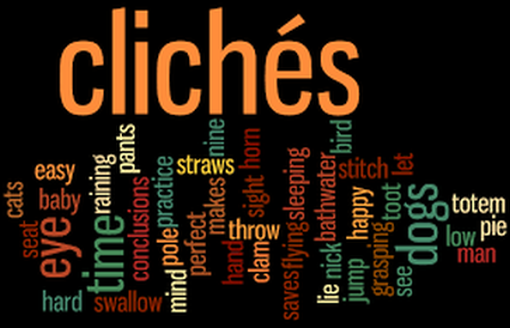Fighting Back Against ClichésBy Jose A. CarilloA close friend of mine once asked me why I was so harsh with clichés, and why I wanted to get rid of all of them. It’s all a matter of principle, I said. I will hunt them down as a form of sport. But I told her that one could only do so much. To eliminate all the clichés in our English would be close to impossible. It would be like stripping off every ounce of the romance and magic that reside in the language; it would be like killing the language itself. This is because English speakers everywhere will continue to use clichés to liven up otherwise drab conversations and existences. And no matter what we say, Filipino English-speakers will continue to appropriate for themselves clichés such as “a glimmer of hope,” “an iota of doubt,” “a grasping at straws,” “cry me a river,” “all’s fair in love and war,” “my back against the wall,” “hope springs eternal,” “burn the midnight oil,” and “every dark cloud has a silver lining.” A more valid question to ask, I told my friend, is when will most people learn to use English-language clichés sparingly and wisely.

The real problem is that many of us drug our English insensible with an overdose of clichés. Everybody knows this but simply keeps quiet about it. Hardly anybody protests. We allow teachers to drone English-language clichés ceaselessly to sleepy classrooms. We allow lawyers to freely sprinkle them on official records and on our courts in the name of justice. We allow our legislators to routinely invoke them as a matter of parliamentary privilege. We allow media people to righteously write or utter them in the guise of objective reporting and press freedom. And we allow religious charlatans of all stripes from Batanes to Basilan to ruthlessly foist them on gullible people as a matter of faith. Everybody seems to profit from clichés instead of getting reprimanded and punished for them.
But this is exactly what we will do right now. We will take a quick look at how, in practice, both English and good sense get thrashed in the midst of so many clichés. We will expose some composite specimens of clichés and cliché-like expressions that some of us actually make a living of, and we will show how some of us quite surely lapse into them during our unguarded moments. Then we will retaliate right off by giving their plain and simple English equivalent:
“It is of utmost importance that you give the fullest attention to your lessons if you intend to achieve at least a passing mark in this particular subject that I am making such a great effort to elucidate to you.” (“Study harder to pass this subject.”)
***
“Your Honor, I respectfully submit that in the instant case of the People of the Philippines versus __________, namely Criminal Case CC No. _________ as docketed in this Honorable Court on October 22, 1994, an affidavit of desistance has been executed by the Plaintiff dated _________, on account of which I hereby request this Honorable Court that the instant case be dismissed without prejudice.” (“Your Honor, I would like to submit Criminal Case No. _________ for dismissal. The complainant no longer wants to pursue the case, as shown in this affidavit.”)
***
“This humble representation from the third district of ________is of the opinion that the honorable gentleman from the lone district of ________ is out of order at this point in time.” (“I really think the guy is making a fool of himself.”)
***
“The alleged serial rapist of the lovely meat fortune heiress from Marulas was let off the hook by baffled police last night after the college coed positively identified him as her purported savior instead.” (“The daughter of the owner of a small
tocino factory in Marulas told police last night that the man they arrested for rape was innocent. There was no rape, and the 19-year-old senior from an exclusive girls’ school (not
coed as earlier reported) said that, in fact, the suspect saved her from one.”)
***
“The Lord came in a blinding flash last night and spoke to me, giving me a chilling message that froze me and made me tremble on my feet. He said that He will end the world at precisely 12:00 midnight on _________ because of our wickedness, but if we prayed hard enough and made the necessary sacrifices and willingly parted with our worldly possessions, He may be prevailed upon not to let our terrible fate come to pass.” (“Last night I dreamed that the Lord would end the world. Put your contribution in that offering box over there, say your prayers, and I will take care of the problem.”)
***
Why do clichés infiltrate our English even against our will?
It is because like every part of a living language, they are organisms with a life cycle of their own. Most of them begin as sharp insight, song, or even poetry: “right in the line of fire” (unwilling but centrally involved), “starting off on the right foot” (beginning something on a sound basis), “give the cold shoulder” (ignore), “Never ask for whom the bell tolls, it tolls for thee” (lines from John Donne’s poem, part of which was appropriated by Ernest Hemingway as the title for his novel,
For Whom the Bell Tolls).
But like humans, many clichés grow into over-indulged and overfed adolescents, turn fat and cholesterol-laden and blasé as adults, then get shriveled and weary as they slide into old age: they begin “to have a loose screw” (to go crazy), “bite the dust” (to lose miserably), then “kick the bucket” (to die finally). And the mass media and the Internet have, in our time, mercilessly speeded up this aging process. Every novel shortcut to linguistic expression soon becomes the jaded universal currency of English. Today’s gem of an idea and spark of creative thought may well, in fact, become tomorrow’s dreaded cliché. (circa 2002)
This essay first appeared in the column “English Plain and Simple” by Jose A. Carillo in The Manila Times
in 2002 and subsequently appeared in Jose Carillo’s book English Plain and Simple: No-Nonsense Ways to Learn Today’s Global Language
. Copyright © 2004 by Jose A. Carillo. Copyright © 2008 by Manila Times Publishing. All rights reserved.---------
This forms part of the collection of his personal essays that the author has been posting in the Forum every Wednesday from October 26, 2016 onwards.
COMPANION ESSAY:The Lovely Clichés Worth KeepingRELATED LISTENING: “Come In From The Rain” (YouTube)As performed by Toni Tennille (1977)
“Come In From The Rain” (YouTube)As performed by Toni Tennille (1977)